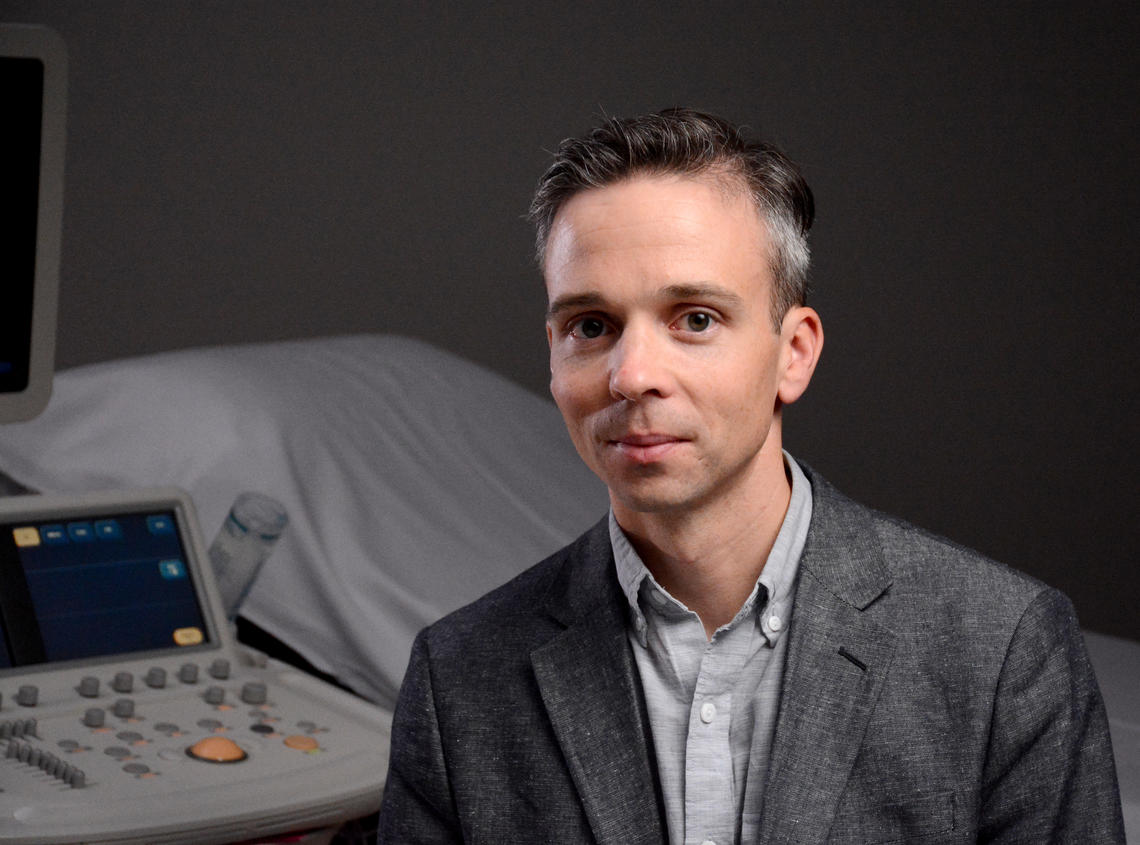Dec. 20, 2017
Stephen Wilton strives for far-reaching impact on lives of those affected by cardiovascular disease

Stephen Wilton has been recognized as a Peak Scholar for 2017.
Dawn Smith, Libin Cardiovascular Institute of Alberta
Like all doctors, the Libin Cardiovascular Institute of Alberta’s Dr. Stephen Wilton works tirelessly to better the lives of his patients by providing the best care possible.
But Wilton, an assistant professor in the departments of Cardiac Sciences and Medicine at the University of Calgary’s Cumming School of Medicine (CSM), strives for a far-reaching impact on the lives of those impacted by cardiovascular disease through his work in collecting and studying health outcomes data from patients across the country.
Inspired by several mentors, including Dr. Bill Ghali, a Libin Institute member and the CSM’s scientific director of the O’Brien Institute for Public Health, Wilton became interested in outcomes research early on and, in 2013, was named co-director of research of the Alberta Provincial Project for Outcomes Assessment in Coronary Heart disease (APPROACH), along with Dr. Matthew James. APPROACH is a national registry of patients who have had invasive coronary procedures.
Data gathered by APPROACH, which was established at UCalgary in 1995, is heavily relied upon by health system administrators to assess the quality of health care delivery, and has been used to generate more than 250 scientific papers.
Since Wilton and James took on this role, they have helped APPROACH develop software modules to better capture the journey of cardiac patients, and are testing solutions that allow data to be used in real time to help front-line doctors make better decisions.
Wilton is also co-leading a project aimed at reducing the number of heart attack survivors dying from cardiac arrest. He is working alongside patient lead Robert MacLachlan and Dr. Jaimie Manlucu of Western University with the Cardiac Arrhythmia Network of Canada Network of Centres of Excellence (CANet NCE) on the project.
“We know that identifying people who are left with weakened heart pump function after a heart attack are at risk of cardiac arrest,” says Wilton. "If this weakened pump function is identified, there are effective treatments available: however, many people do not have this test performed.”
The goal of the three-year project, the first phase of a larger program called Acute Myocardial Infarction Quality Assurance (AMIQA) Canada, is to measure how many patients who survive a heart attack have had a followup heart imaging test called an echo at the recommended time, and to find out why the tests are not being done more often.
The project, which received a CANet grant with matching funds from Libin and industry partners, will include patients from across Canada. Those patients, along with their doctors and health system officials, will be asked to fill out a survey to help researchers better understand why some patients may not be getting the tests and treatments they need.
Wilton’s work has been noticed. Earlier this year he was recognized as a Peak Scholar for 2017 at the fourth annual Peak Scholars Recognition Luncheon.
Peak Scholars are researchers whose academic work has had a positive social or economic impact in the community. Scholars are nominated by their deans for projects that demonstrate community or knowledge engagement, entrepreneurship, tech transfer, innovation or collaborative research.
Wilton was humble about the nomination, noting his success is due, in large part, to his team. “I was honoured to be included in this amazing group. I feel that our work is really just beginning, but in a few years we will be able to show some real impacts for Canadians with heart disease,” he says.
Check out the full list of 2017 Peak Scholars.
